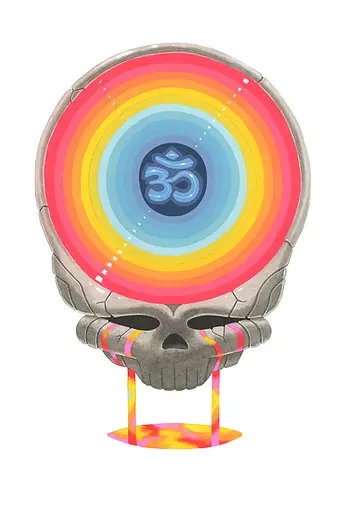The Subtle Art of Unburying God

“God was always invented to explain mystery. God is always invented to explain those things that you do not understand.” ~Richard Feynman
Sometimes, most of the time, we forget how young we are as a species. Time is relative after all, and though our time on this earth is but a flash in the pan compared to the greater universe, to us it feels like an eternity. We feel like we’ve gone so far. We’ve accomplished so much. Our technologies have us beside ourselves.
But this also causes us to get ahead of ourselves. We get a “big head” about what we’ve accomplished. We imagine we have most things figured out. When really, we are a floundering baby of a species with brains just big enough to stay alive and innovate but not big enough to see how our innovations become traps. Mostly cognitive and psychological traps, but also political and religious traps.
And the biggest trap of all? Our concept of God.
Burying God:
“One of the main functions of organized religion is to protect people against a direct experience of God.” ~Carl Jung
In our naivete and mortal desperation for an “answer to it all” we created God. We created God to alleviate our death anxiety, to square the circle of infinity, and to pinpoint the improbability of probability. We were a stubbornly vain species, and so we could not help but create a “technology of ecstasy” to help us transcend death. And so, intolerant of reality and the mortality it imposed upon us, we created God, the ultimate technology. The absolute Somethingness that we ushered in to trump the absolute Nothingness of our own impermanence.
But in our ignorance, we deified God. We anthropomorphized God. We made “Him” in our image. We vainly attempted to pigeonhole infinity into a finite ideal. And before we knew it, we were tripping over idols and getting caught in sticky webs of dogma. Our God clashed with their God. Your God collided with my God. We turned an “answer to it all” into a religion and failed spiritually. We found ourselves wanting at the invincible feet of Infinity.
But then the religious God died. We met Buddha on the path and killed him. The path is littered with murdered megalomanic egos. It’s a veritable graveyard of deicide. As Nietzsche said, “God is dead! He remains dead! And we have killed him.”
Even our personal ego’s attachment to “God” has a Question Mark Sword penetrating through its self-righteous heart. And even as this makes us balk, even as this makes us fear and tremble, we realize that it is just the tiny part of us—our false self, our placated self, our fearful self—that was hoodwinked and indoctrinated by cultural conditioning, and the bigger part of us—our authentic self—is all the more liberated because of it.
As PC Hodgell said, “That which can be destroyed by the truth should be.”
Nonetheless, this religious God is dying to this day. His reeking corpse fills temples, churches, synagogues, and mosques the world over. His bones are on display in the form of religious artifacts: most prominent of all, the splinter lodged in our mind. The cognitive dissonance we wrestle with. The sunk cost fallacy we cling to. The primordial Red Herring we are distracted by. The mortal dread we deny.
But here’s the beauty, the old caterpillar God of religion had to die for the spiritual butterfly of God to reveal its true nature: The Infinite Interconnectedness of All Things. The old blind God of religion had to die for God as Infinity Itself to see the light.
Unburying God:
“We are all mothers of God, for God is always needing to be reborn.” ~Meister Eckhart
Not every question has an answer, but every answer has a question. Let that statement sink in.
We never definitively answer any question, just like we never necessarily solve our problems. We simply outgrow them. We add capacities and experiences that eventually make us bigger than either the question, answer, or problem. So it also goes with the concept of God. We outgrew the religious God, and now we are bigger than “He” could ever be.
As James Russell Lowell said, “Time makes ancient good uncouth.”
We now understand, as Joseph Campbell did, that “God is an infinite sphere, whose center is everywhere and circumference nowhere.” How could we in good conscience go back to the uncouth ancient good of the religious God when we know damn well that there is a better way of perceiving God? A way that gets us out of our own way. A way that opens our hearts and lets our soul breathe. A way that cripples the dogma that has been crippling us for a millennium.
A religious God implies a deity bound by dogma, institutions, and historical texts, whereas a spiritual God is a more personal, internal, and perhaps universal or even mystical experience of the sacred. This simple shift in perspective is a move from external authority to internal authenticity. It paves the way for individuals to seek divinity or meaning in more personal, existential, or even poetic forms.
As Mark Twain said, “Continuous improvement is better than delayed perfection.” Indeed. The delayed perfection of the religious God must be cooked into the continuous improvement of Truth, lest we starve at the table of delusion.
We dined at the table of delusion for too long. Now it’s time to feast on the spiritual truth: that everything is connected to everything else. There’s no anthropomorphized being sitting up high judging our souls. And even if there somehow, improbably, was, it would still have to be a part of a greater Infinity. There would still have to be something that created that being, and then something that created that other being, ad infinitum.
Best to simply cut out the middleman. And that middleman is the religious God. That middleman is religion. That middleman is dogma.
The subtle art of unburying God is flexing spiritually. It’s existentially crushing out. It’s getting over our ego’s attachment to outdated “truth.” It’s swapping out petty belief for almighty faith. It’s the nuance of redefining God as Infinity itself, to include all false gods that created any other false gods.
Unburying God is transforming God into a question that we don’t need to answer. We simply allow God to be infinite. No fuss. No muss. No “Thou Shalts.” God is an Infinite Question Mark in the sky, fiery, razor sharp, and cutting through all so-called answers: a mighty symbol. A weapon against the darkness of closemindedness, rigidness, bad faith, and dogmatism. A failsafe against indoctrination, cultural conditioning, bamboozlement, and brainwashing.
A reckoning for some and a wrecking for others, sure. But no price is too high to pay for the privilege of finally becoming one with all things.
About the Author:
Gary Z McGee, a former Navy Intelligence Specialist turned philosopher, is the author of Birthday Suit of God and The Looking Glass Man. His works are inspired by the great philosophers of the ages and his wide-awake view of the modern world.
This article (The Subtle Art of Unburying God) was originally created and published by Self-inflicted Philosophy and is printed here under a Creative Commons license with attribution to Gary Z McGee and self-inflictedphilosophy.com. It may be re-posted freely with proper attribution, author bio, and this statement of copyright.


